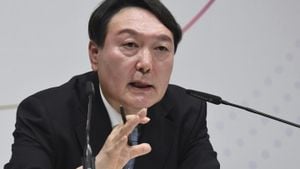Elon Musk has ignited controversy following his speech during Donald Trump’s inauguration celebration, where critics claim he mimicked a Nazi salute. At the Capitol One Arena on January 20, 2021, Musk's gestures — characterized by the positioning of his right arm, angled with the palm downward — drew immediate backlash from viewers, with some labeling it as emblematic of fascist symbolism.
During the event, Musk expressed gratitude to Trump supporters, saying, “Thank you for making it happen!” as the crowd erupted with cheers. He followed this with notable gestures, raising his arm at one point to signal appreciation to the audience and giving what appeared to be another similar gesture directed at the American flag. Musk's actions, initially met with fervent applause, soon transitioned to scrutiny, as several commentators and politicians harmonized, branding the gestures as reminiscent of far-right salutes.
The Anti-Defamation League (ADL), which has defined Nazi salutes as “raising an outstretched right arm with the palm down,” noted the gravity of the situation. Historian Ruth Ben-Ghiat, specializing in fascism, suggested it was “a Nazi salute and a very belligerent one too,” underscoring the historical connotations tied to such gestures. The divide between interpretations became evident as reactions proliferated across social media platforms, where some users expressed outrage, branding Musk as giving “a Sieg Heil” salute.
Democratic strategist Sawyer Hackett sharply criticized Musk's actions, tweeting, “Our new co-president Elon Musk gives a Nazi salute on day one of Trump’s presidency,” reflecting the incredulity many felt about the acceptable limits of political expression. Similarly, Spanish deputy prime minister even quit the platform X (formerly known as Twitter) after the incident, reflecting the weight of the controversy.
While Musk’s critics were vocal, his defenders framed the backlash as exaggerated. Newsweek opinion editor Batya Ungar-Sargon defended Musk's actions, stating, “This was just Elon Musk, exuberantly throwing his heart to the crowd. We don’t need to invent outrage.” The ADL also weighed in, arguing Musk merely made “an awkward gesture,” acknowledging the heightened sensitivity surrounding such actions within contemporary political discourse.
The varying interpretations of Musk's gestures took center stage. Historians and scholars weighed on the matter, contextualizing the gestures within their historical framework. While some labeled it as directly evocative of fascist rhetoric, others emphasized the gestures could be seen through the lens of social clumsiness associated with public figures like Musk, especially considering his high-profile yet unconventional persona.
Despite Musk's response to the accusations — which included dismissing critics with remarks such as, “Frankly, they need to have... the ‘everyone is Hitler’ attack is sooo tired” — the debate about the ethical and cultural significance of his gestures persisted. This incident arrives on the heels of Musk’s entanglement with far-right groups and ideologies, making his political posturing even more controversial. Just prior to the inauguration, Musk had voiced support for the Alternative for Deutschland (AfD), which has been linked to neo-Nazi groups, showing how interwoven his rhetoric is with international nationalistic movements.
Many observers remain concerned about the ramifications of such gestures, particularly at pivotal political events. The specter of fascist symbolism looms large on American soil, where political speech increasingly melds with performance art. The reaction from the left, including prominent figures like Alexandria Ocasio-Cortez, highlighted tensions over the political discourse surrounding identity and extremism. Ocasio-Cortez condemned the ADL for its leniency, remarking critically on its efforts to defend Musk over what appeared to be his invocation of extremist gestures.
Meanwhile, as the public continues to dissect Musk's actions, they remain emblematic of broader societal fractures over identity politics and extremism. The repeated attempts to frame such actions as either politically charged or socially awkward reflect the polarized nature of contemporary discourse, wherein public figures like Musk serve as both catalysts and barometers for shifting cultural norms.
With reactions still pouring across various platforms, the fallout from Musk’s speech is bound to resonate within discussions surrounding freedom of expression, political affiliation, and the weight of historical consciousness. Observers are left to grapple with not just Musk's intentions, but the cultural and political ramifications of his actions as they play out on the global stage. The incident serves as yet another illumination of how political gestures, even if seemingly innocuous or unintended, may tap deep reserves of historical tension and societal concern.



